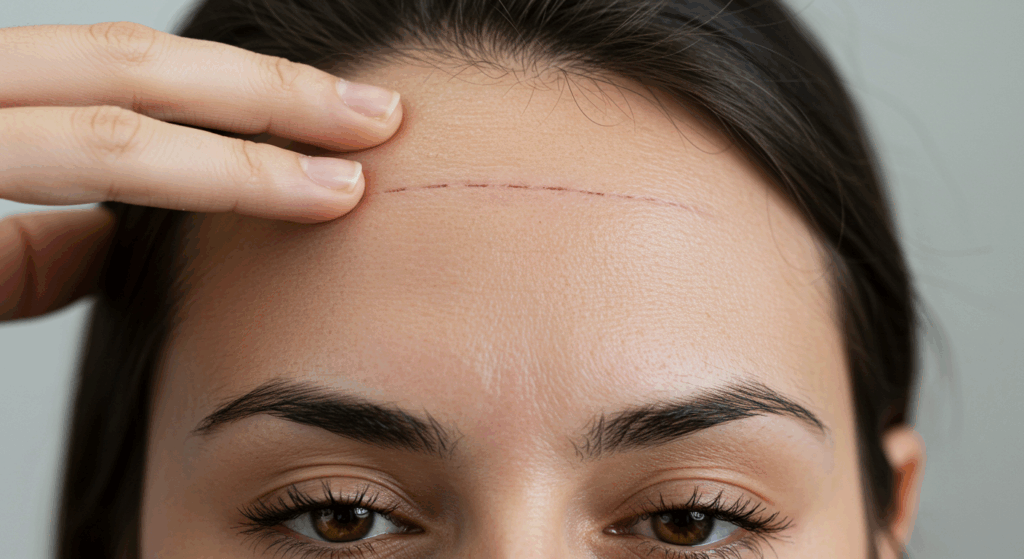Een coronal insnijding procedure is a significant step, whether for medical or cosmetic reasons. Proper pre-operative voorbereiding is crucial for ensuring a smooth chirurgie and optimal herstel. Dit gids provides a comprehensive, step-by-step breakdown of everything you need to know before your procedure, from medical evaluations to lifestyle adjustments.
By following these guidelines, you’ll minimize risico's, enhance recovery, and achieve the best possible outcome. Let’s dive into the essential preparations you need to make.

Inhoudsopgave
1. Medische evaluaties en consultaties
1.1. Pre-operatieve medische beoordeling
Before your coronale incisieprocedure, your surgeon will conduct a thorough medical assessment to ensure you’re a suitable candidate. This typically includes:
- Bloedonderzoek: Om te controleren op infecties, bloedarmoede of stollingsstoornissen.
- Elektrocardiogram (ECG): Om de gezondheid van het hart te beoordelen, vooral bij patiënten ouder dan 40 of met een voorgeschiedenis van hartziekten.
- Chest X-Ray: Om de gezondheid van de longen te beoordelen en ademhalingsproblemen uit te sluiten.
- Allergietesten: To identify potential allergic reactions to anesthesie or medications.
1.2. Overleg met uw chirurg
Tijdens uw consult zal uw chirurg:
- Bespreek uw medische geschiedenis, inclusief eerdere operaties, chronische aandoeningen en medicatie.
- Leg de procedure gedetailleerd uit, inclusief de risico's, voordelen en verwachte resultaten.
- Geef preoperatieve instructies die zijn afgestemd op uw specifieke behoeften.
For more insights on preparing for chirurgie, check out our guide on hoe je je voorbereidt op plastische chirurgie.
2. Aanpassingen aan uw levensstijl vóór de operatie
2.1. Dieet en voeding
Your diet plays a critical role in preparing your lichaam for surgery. Focus on:
- Hydratatie: Drink dagelijks minimaal 8 glazen water om gehydrateerd te blijven.
- Gebalanceerd dieet: Consume a diet rich in proteins, vitamins, and minerals to support genezing. Include lean meats, fruits, vegetables, and whole grains.
- Vermijd alcohol en cafeïne: Beide kunnen uitdroging veroorzaken en de anesthesie verstoren.
2.2. Roken en nicotine
Smoking and nicotine use can impair healing and increase the risk of complicaties. It’s essential to:
- Stop ten minste 4 weken voor de operatie met roken.
- Vermijd nicotinepleisters, -kauwgom en vape-producten.
2.3. Oefening en fysieke activiteit
Hoewel actief blijven belangrijk is, moet u zware inspanning vermijden in de week voorafgaand aan uw operatie. Concentreer u op lichte activiteiten zoals wandelen om de bloedsomloop te stimuleren.
3. Medicatiebeheer
3.1. Medicijnen die u moet vermijden
Bepaalde medicijnen kunnen het bloeden verergeren of de anesthesie verstoren. Uw chirurg kan u adviseren om het volgende te vermijden:
| Medicatietype | Voorbeelden | Wanneer moet je stoppen? |
|---|---|---|
| Bloedverdunners | Aspirine, Warfarine, Ibuprofen | 2 weken voor de operatie |
| Kruidensupplementen | Ginkgo Biloba, knoflook, ginseng | 2 weken voor de operatie |
| Vitamine E | Supplementen met hoge dosering | 2 weken voor de operatie |
3.2. Goedgekeurde medicijnen
Your surgeon may prescribe or approve certain medications to manage pijn or prevent infections post-surgery. Always follow their instructions regarding:
- Antibiotica om infectie te voorkomen.
- Pijnstillers voor postoperatief comfort.
4. Logistiek en planning
4.1. Vervoer regelen
You won’t be able to drive immediately after surgery. Arrange for a friend or family member to drive you thuis post-procedure.
4.2. Bereid uw herstelruimte voor
Zorg thuis voor een comfortabele herstelruimte met:
- Kussens om uw hoofd omhoog te houden.
- Ice packs to reduce zwelling.
- Gemakkelijk te bereiden maaltijden en snacks.
- Entertainment zoals boeken, films en muziek.
4.3. Plan voor postoperatieve zorg
Zorg ervoor dat u de eerste 24-48 uur na de operatie iemand heeft die u kan helpen. Zij kunnen u helpen met:
- Medicijnen toedienen.
- Maaltijden bereiden.
- Hulp bij mobiliteit.
Voor meer tips over herstel, lees ons artikel over tips voor een vlot herstel na een operatie.
5. Mentale en emotionele voorbereiding
Een operatie ondergaan kan emotioneel zwaar zijn. Zo bereid je je mentaal voor:
- Informeer uzelf: Leer meer over de procedure, het herstelproces en de verwachte resultaten om angst te verminderen.
- Stel realistische verwachtingen: Understand that recovery takes time and resultaten may not be immediate.
- Practice Relaxation Techniques: Meditatie, diepe ademhaling en yoga kunnen helpen om stress te beheersen.
6. Risico's en complicaties begrijpen
Elke chirurgische ingreep brengt risico's met zich mee. Bij een coronale incisieprocedure zijn de volgende mogelijke complicaties mogelijk:
- Infectie op de incisieplaats.
- Bloeding of hematoom.
- Zenuwbeschadiging die leidt tot gevoelloosheid of zwakte.
- Scarring or haar loss along the incision line.
Voor meer informatie over risico's kunt u ons artikel over endoscopische versus coronale wenkbrauwlift: voor- en nadelen.
7. Checklist voor de operatie
Gebruik deze checklist om ervoor te zorgen dat u volledig voorbereid bent op uw coronale incisieprocedure:
| Taak | Voltooid |
|---|---|
| Voltooi alle preoperatieve medische tests | |
| Raadpleeg uw chirurg en stel al uw vragen | |
| Pas uw dieet aan en vermijd alcohol, cafeïne en roken | |
| Stop met het nemen van bloedverdunners en kruidensupplementen | |
| Regel vervoer en postoperatieve zorg | |
| Bereid uw herstelruimte thuis voor | |
| Oefen ontspanningstechnieken om stress te beheersen |

Conclusie: uw pad naar een succesvolle procedure
Belangrijkste punten
- Een goede voorbereiding vóór de operatie is essentieel om de risico's te minimaliseren en een vlot herstel te garanderen.
- Volg de instructies van uw chirurg op met betrekking tot medische evaluaties, aanpassingen van uw levensstijl en medicatiebeheer.
- Plan de nazorg en bereid uw herstelruimte vooraf voor.
- Begrijp de mogelijke risico's en complicaties die gepaard gaan met de coronale incisieprocedure.
Volgende stappen
Nu u over deze uitgebreide gids beschikt, kunt u de volgende stappen uitvoeren:
- Plan uw preoperatieve medische beoordelingen.
- Als u nog vragen heeft, neem dan contact op met uw chirurg.
- Begin met het doorvoeren van veranderingen in uw levensstijl om uw lichaam voor te bereiden op de operatie.
- Regel logistiek, zoals transport en postoperatieve zorg.
Veelgestelde vragen (FAQ)
1. Hoe lang duurt het herstel na een coronale incisieprocedure?
De hersteltijd varieert, maar de meeste patiënten kunnen binnen 2-4 weken hun normale activiteiten hervatten. Volledig herstel kan enkele maanden duren.
2. Zal ik zichtbare littekens hebben na de behandeling?
The coronal incision is typically made along the haarlijn, which helps conceal scars. However, some scarring may be visible initially but usually fades over time.
3. Mag ik mijn haar wassen na de operatie?
U moet uw haar gedurende ten minste 48 uur na de operatie niet wassen. Uw chirurg zal u specifieke instructies geven over wanneer het veilig is om uw haar weer te wassen.
4. Wat moet ik dragen op de dag van de operatie?
Draag losse, comfortabele kleding die niet over je hoofd hoeft te worden getrokken. Vermijd sieraden, make-up en contactlenzen.
5. Hoe kan ik de pijn na de behandeling beheersen?
Uw chirurg zal pijnstillers voorschrijven om het ongemak te verlichten. Het aanbrengen van ijspakkingen op de incisieplek kan ook helpen om zwelling en pijn te verminderen.
6. Zijn er dieetbeperkingen na de operatie?
Eet de eerste dagen alleen zacht, licht verteerbaar voedsel. Vermijd pittig, knapperig of moeilijk te kauwen voedsel dat de wond kan belasten.
7. Wanneer kan ik weer aan het werk?
De meeste patiënten kunnen binnen 2-3 weken weer aan het werk, afhankelijk van de aard van hun werk. Vermijd inspannende activiteiten gedurende ten minste 4-6 weken.
8. Wat zijn de tekenen van een infectie na een operatie?
Let op symptomen zoals toegenomen pijn, roodheid, zwelling of afscheiding uit de incisieplek. Koorts of koude rillingen kunnen ook wijzen op een infectie. Neem onmiddellijk contact op met uw chirurg als u een van deze symptomen opmerkt.
Bezoek Dr.MFO Instagram-profiel om echte patiënttransformaties te zien! Krijg een glimp van de ongelooflijke resultaten die zijn bereikt door gezichtsbehandelingen feminisatiechirurgie en andere procedures. Het profiel toont foto's van voor en na. foto's die benadrukken Dokter MFO's expertise en artistieke visie bij het creëren van natuurlijke, prachtige resultaten.
Klaar om de volgende stap in uw reis te zetten? Plan een gratis consultatie met Dokter MFO ( Beste chirurg voor gezichtsfeminisatie vandaag. Tijdens het consult kunt u uw doelen bespreken, eventuele vragen stellen en meer te weten komen over hoe Dokter MFO kan u helpen uw gewenste look te bereiken. Aarzel niet om gebruik te maken van deze gratis mogelijkheid om uw opties te verkennen en te zien of Dokter MFO de juiste keuze voor u is.








